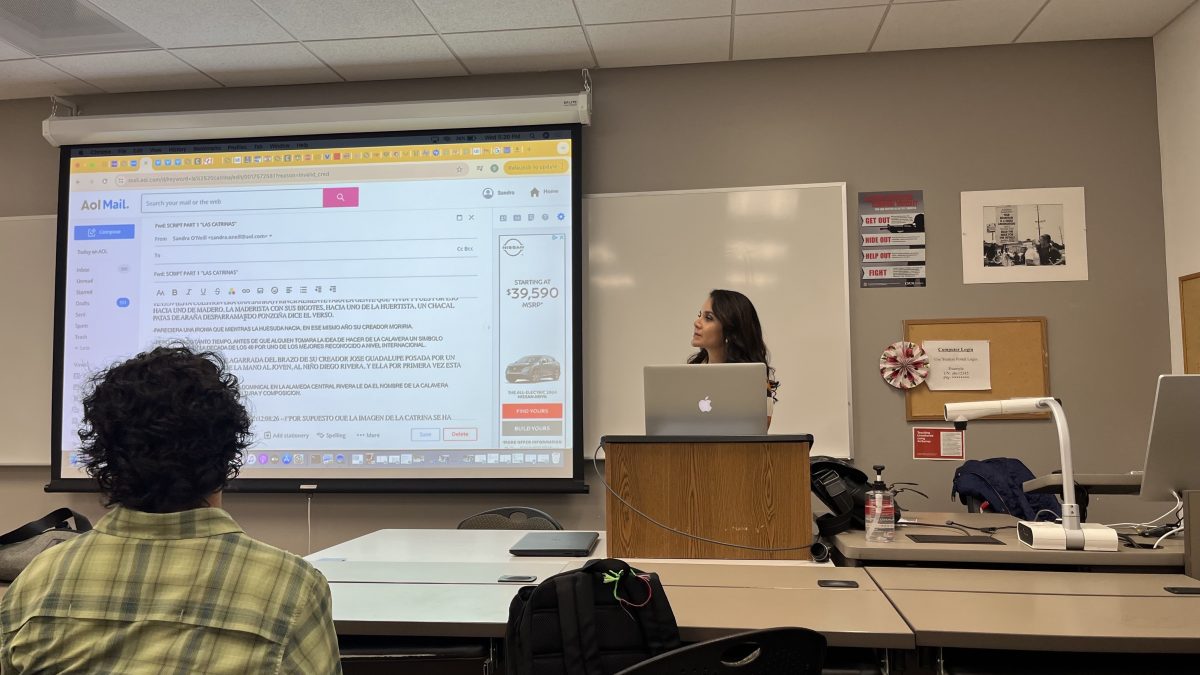In Latino culture, parents often immigrate, leaving their children with relatives in their home countries such as Mexico and El Salvador, to make the dangerous journey across the border in search of a better life.
Sandra O’Neill was raised in Guanajuato, Mexico, by her aunt while her mother crossed the United States border to provide better opportunities for her family. O’Neill was eventually brought to the U.S. at the age of 11.
On Oct. 16, O’Neill told her story with a group of CSUN students during a presentation in Manzanita Hall. She recounted her journey of becoming an Emmy Award-winning reporter for Telemundo and offered advice to future journalists as part of Hispanic Heritage Month celebrations.
O’Neill graduated from high school in South Gate and attended Long Beach City College, becoming the first in her family to graduate from both.
While attending college, she interned at KWPW radio and worked weekends in promotions and evening shows at Viva 107.1. She also wrote about entertainment and community events for local free weekly publications.
“Take advantage of internship opportunities,” O’Neill said. “Cover your bases and concentrate on learning everything about that job.”
O’Neill has won multiple Emmy Awards and has worked for Spanish-language outlets such as Telemundo and Univision for more than 20 years.
In 2002, she began an internship at Estrella TV, a Spanish-language outlet.
“A lot of us that you see now in Spanish television that are big shots, started at Estrella TV,” said O’Neill.
After securing an anchoring position, O’Neill quit and moved to New York to support her husband’s new job.
While in New York, O’Neill spent five years as an anchor and reporter for Univision before moving back to Los Angeles, where she worked at Univision for another five years.
She then joined Telemundo in 2018 and has been with the company since.
While at Telemundo, O’Neill produced a two-part documentary called “Las Rosies”, which tells a story of three Hispanic women; Mary Fierros, Francisca Miranda and Connie Rangel Gomez, and their time as riveters during WWII.
Riveters were women who worked in factories, primarily in shipyards, fastening metal pieces together using rivets, a type of metal pin, to build war materials like airplanes and ships.
O’Neill took the time to answer students’ questions and provided advice for pursuing any career within the journalism field.
She advised students to always stay prepared.
“That will give you confidence, even if you are beginning your career,” said O’Neill. “Know your subject, know everything before you go on an interview. You never know what will come next.”
O’Neill also encouraged students to keep practicing whether it’s writing, reporting or editing.
“Practice makes perfect. We’re not always going to be great, but you’re going to keep getting better and better,” O’Neill added.
Staying sharp was also part of her advice, “You cannot let your guard down, you have to be on top of things, or you will miss something,” said O’Neill.
Many students found her advice useful.
“It was beyond helpful,” said Melisa Valenzuela. “It’s really great that she talked to us because she’s in the business right now and her advice is invaluable to me as a student.”
For more journalism events happening around campus, check out the CSUN Journalism website.






